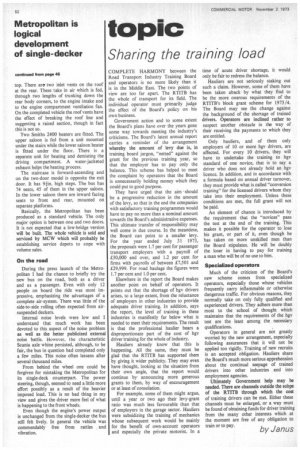topic
Page 54

If you've noticed an error in this article please click here to report it so we can fix it.
Sharing the training load
COMPLETE HARMONY between the Road Transport Industry Training Board and operators is no more likely than it is in the Middle East. The two points of view are too far apart. The RTITB has the whole of transport for its field. The individual operator must primarily judge the effect of the Board's policy on his own business.
Government action and to some extent the Board's plans have over the years gone some way towards meeting the industry's criticisms. The Board's latest annual report carries a reminder of the arrangement whereby the amount of levy due is, in training board jargon, "netted" against the grant for the previous training year, so that the employer has to pay only the balance. This scheme has helped to meet the complaint by operators that the Board is unnecessarily holding money which they could put to good purpose.
They have urged that the aim should be a progressive reduction in the amount of the levy, so that in the end the companies with satisfactory training programmes would have to pay no more than a nominal amount towards the Board's administrative expenses. This ultimate transfer of responsibility may well come in due course. In the meantime, the Board can point to a smaller levy. For the year ended July 31 1973, the proposals were 1.7 per cent for passenger transport employers with a payroll of £30,000 and over, and 1.2 per cent for firms with payrolls of between £7,501 and £29,999. For road haulage the figures were 1.7 per cent and 1.0 per cent.
Elsewhere in the report the Board makes another point on behalf of operators. It points out that the shortage of hgv drivers arises, to a large extent, from the reluctance of employers in other industries to provide adequate driver training. In addition, says the report, the level of training in these industries is manifestly far below what is needed to meet their requirements. The result is that the professional haulier bears a disproportionate part of the cost of hgv driver training for the whole of industry.
Hauliers already know that this is happening. All the same, they must be glad that the RTITB has supported them by giving it wider publicity. They may even have thought, looking at the situation from their own angle, that the report would continue by. announcing more generous grants to them, by way of encouragement or at least of consolation.
For example, some of them might argue, until a year or two ago their levy-grant ratio was much less favourable than that of employers in the garage sector. Hauliers were subsidizing the training of mechanics whose subsequent work would be mainly for the benefit of own-account operators and especially the private motorist. In a time of acute driver shortage, it would only be fair to redress the balance.
Hauliers are not seriously staking out such a claim. However, some of them have been taken aback by what they find to be the more onerous requirements of the RTITB's block grant scheme for 1973/4. The Board may see the change against the background of the shortage of trained drivers. Operators are inclined rather to suspect another obstacle in the way of their receiving the payments to which they are entitled.
Only hauliers, and of them only employers of 10 or more hgv drivers, are affected. For every 10 drivers, they will have to undertake the training to hgv standard of one novice, that is to say a driver who does not already hold an hgv licence. In addition, and in accordance with a formula based on annual driver turnover, they must provide what is called "conversion training" for the licensed drivers whom they take into their employment. Unless these conditions are met, the full grant will not be paid.
An element of chance is introduced by the requirement that the "novices" pass the test at the end of the training. This makes it possible for the operator to lose his grant, or part of it, even though he has taken on more unskilled men than the Board stipulates. He will be doubly the loser in having to pay for training a man who will be of no use to him.
























































































































